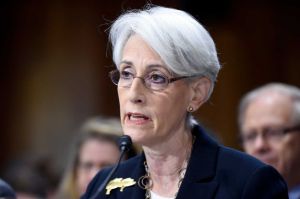 Undersecretary of State Wendy Sherman testifies before the Senate Foreign Relations Committee on July 29.
Undersecretary of State Wendy Sherman testifies before the Senate Foreign Relations Committee on July 29.
By Jonah Aboni
The Senate Foreign Relations Committee quizzed Undersecretary of State for Political Affairs Wendy Sherman on the status of the negotiations on Iran's nuclear program at a hearing on Tuesday. Negotiators announced on July 19 a four- month extension of the talks on reaching a comprehensive nuclear agreement.
Many senators used this opportunity to continue to set unrealistic expectations for a final deal and ignored the important achievements made thus far.
The issues surrounding the P5+1 (China, France, Germany, Russia, the United Kingdom and the United States) negotiations with Iran are contentious and difficult to solve. But some members of the committee are not basing their concerns about an extension of the negotiations and the possible outcome on the facts, nor are some of them taking into account Iran's compliance with the Joint Plan of Action (also known as the interim agreement) agreed to by the P5+1 and Iran in Nov. 2013.
Sen. Bob Menendez, (D-N.J.), chairman of the committee, in his opening statement said, "I've been sceptical of the Iranians' sincerity from day one. And I cannot say that I am less sceptical today than I was six months ago." Several others on the committee echoed his scepticism.
Such comments ignore the successes that have been achieved so far. It is a fact that Iran is complying with the interim agreement. The International Atomic Energy Agency (IAEA) issued monthly reports that show Iran has complied with its obligations under the interim agreement and the IAEA had all of the access it had requested to monitor the terms of the agreement. Given these facts, the intense scepticism about Iran's follow-through on the interim deal is baffling.
It also clear that there has been a roll back of Iran's nuclear program under the interim agreement. As pointed out by Sherman during the hearing, before the interim agreement Iran's nuclear program was "becoming more dangerous" each passing day,.
However, the agreement has prevented Iran's uranium-enrichment program from growing, put more extensive IAEA monitoring in place, and neutralized Iran's stockpile of 20 percent enriched-uranium gas.
Several senators asked Sherman to assure Congress that the talks would not extend beyond the end of the four-month extension on Nov. 24. But declaring an end to further diplomatic efforts if a desired outcome is not achieved months in advance is not a smart policy.
While the negotiations are on going, negotiators should remain focused on clinching a good deal. What is important and clear is that, so far, there has been significant forward progress on key issues in the negotiations and Congress should be flexible and willing to consider viable options to reach a good, comprehensive nuclear deal.
Some senators also expressed concern about a possible covert nuclear weapons program and the strength of the inspection regime, including Sen. Bob Corker (R-Tenn.).
But these concerns can only be addressed with the adoption of the more extensive Additional Protocol "plus" monitoring and verification mechanisms as part of the deal. Transparency, monitoring, and intrusive verification are absolutely critical to any agreement that will be reached.
As Sherman pointed out "one of the pathways of greatest concern is, of course covert action. And transparency and monitoring are the elements that help to ensure that if there are covert actions one knows it in time to be able to take action to stop it from happening in the first place."
It is also far-fetched to describe the on-going efforts as an embarrassing diplomatic and a national security failure, as Sen. Marco Rubio (R-Fla.) said during the July 29 hearing
In reality, current diplomatic efforts have yielded positive results. Iran has complied with all its obligations under the interim agreement and has been more transparent with its nuclear program than ever before. The efforts have succeeded in rolling back Iran's nuclear program. There will continue to be monitoring and intrusive verification to ensure Iran does not cheat on a future, comprehensive nuclear deal. All of this is happening because of the diplomatic efforts.
War is not a good option and sanctions alone are not sufficient. The current diplomatic process is the best option available to guard against a nuclear-armed Iran and it deserves the full support of Congress, not the ill-informed derision of Senator Rubio.
Other members of Congress should check the record and not dismiss the efforts and the achievements that have been made so far. A comprehensive P5+1 nuclear agreement with Iran is by no means assured, but it is clear that a good deal is better than no deal, and responsible Senate and House members must give diplomacy every chance and the time necessary to succeed.
